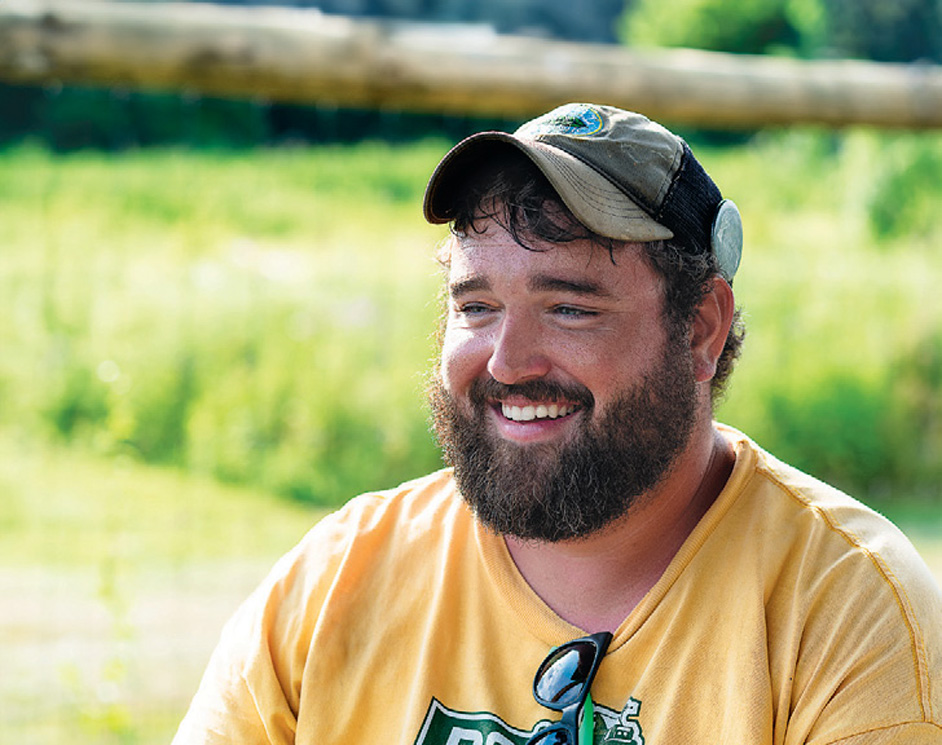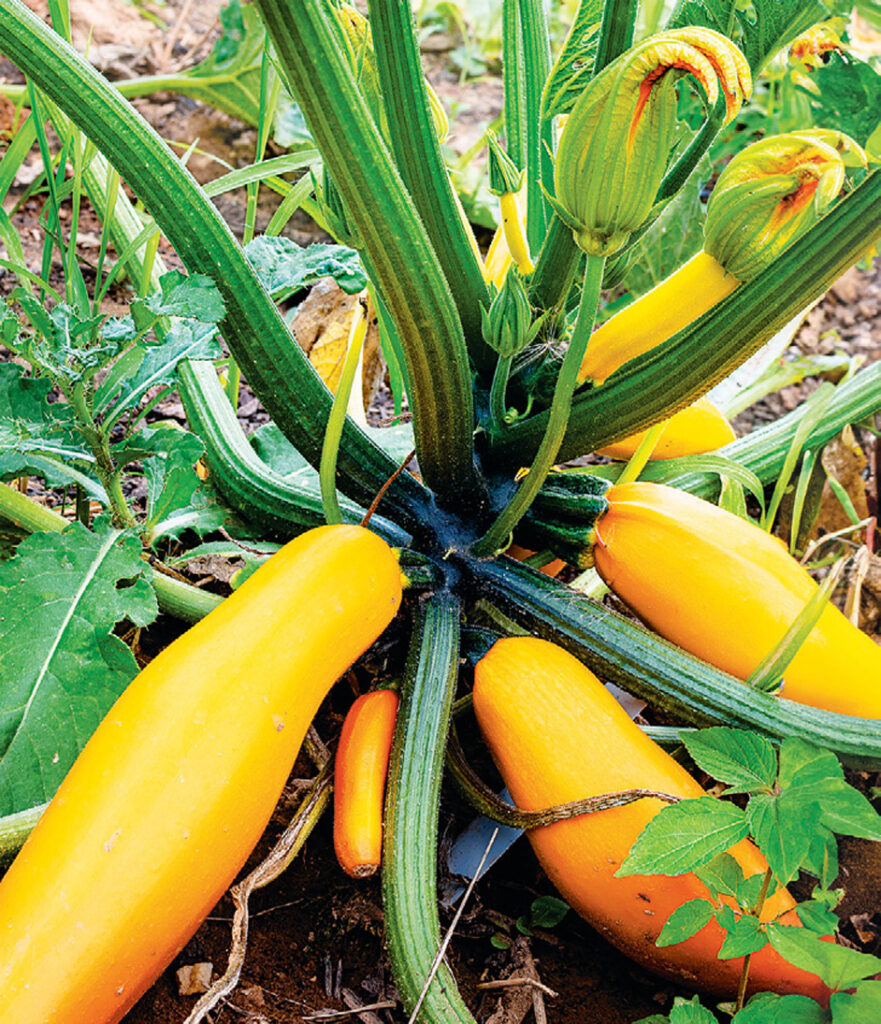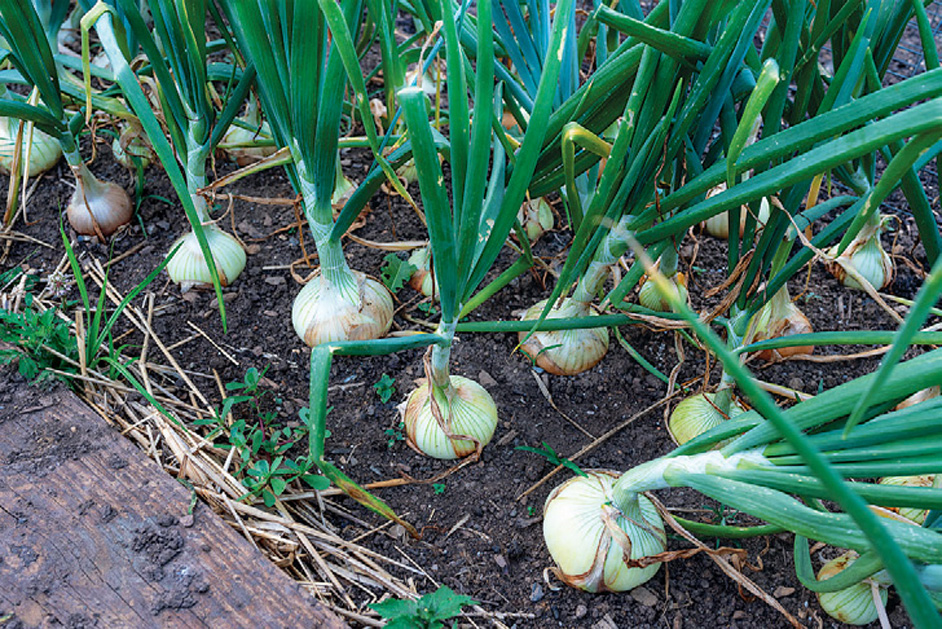BY ABIGAIL SCHAUS
PHOTOS BY ROBERTO QUEZADA-DARDÓN
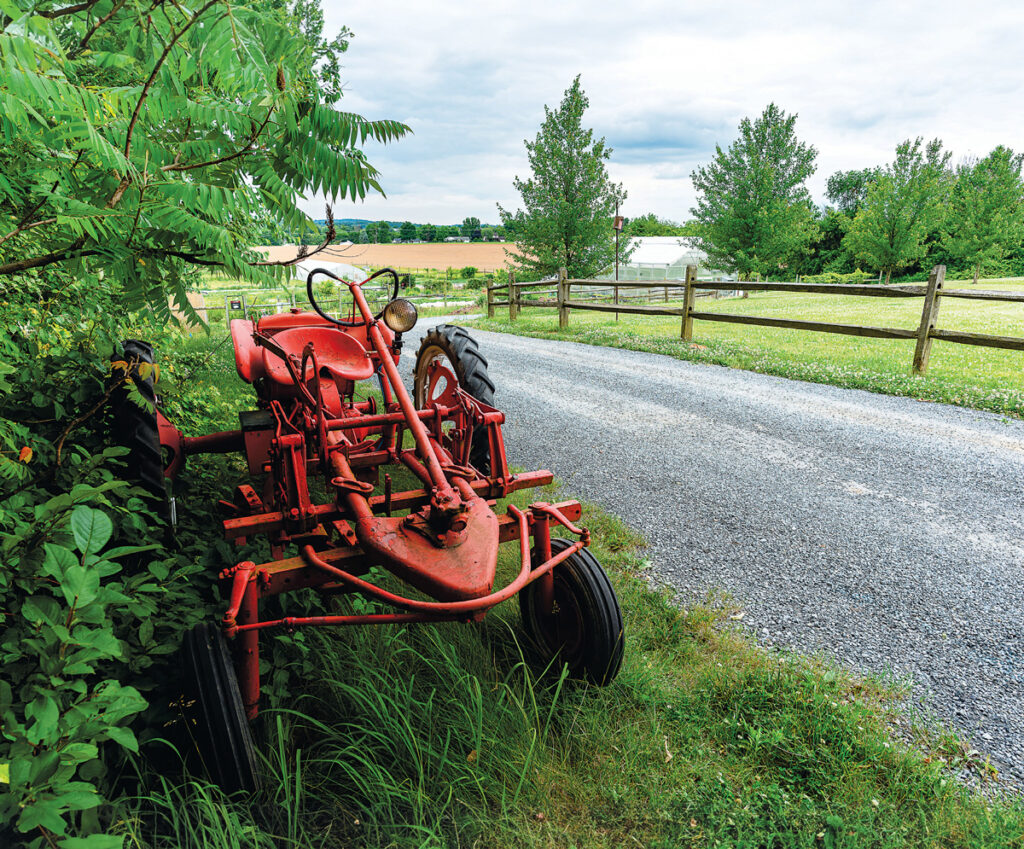
WHEN 18-YEAR-OLD COLLEGE STUDENTS hear the word farmer, they might not picture themselves. But that’s slowly changing, as three colleges in our region expand the definition of higher education and how farming fits into that conversation.
At Lafayette College, Muhlenberg College, and Northampton Community College, students and faculty work side by side to plant gardens, keep bees, create soil amendments, collect rainwater, and feed one another. Students gain valuable exposure to the processes of food production, access, and distribution—practical life skills sure to come in handy.
But there are less obvious benefits, too, such as the importance of being in a harmonious relationship with one another and the land. These spaces intentionally shape an inclusive future for our food system, one that has space for everyone—not just the human stewards but also the soil microbes and the nesting birds.
LAFAYETTE COLLEGE: LAFARM
LaFarm is the three-acre working farm and community garden of Lafayette College. Managed by 34-year-old Josh Parr, the farm’s sole full-time staff member, LaFarm does more than grow veggies; it builds students’ confidence through exposure and experience. With a background in classics and archaeology, Parr stumbled into the farming world while working a summer farm job for fresh vegetables and extra cash.
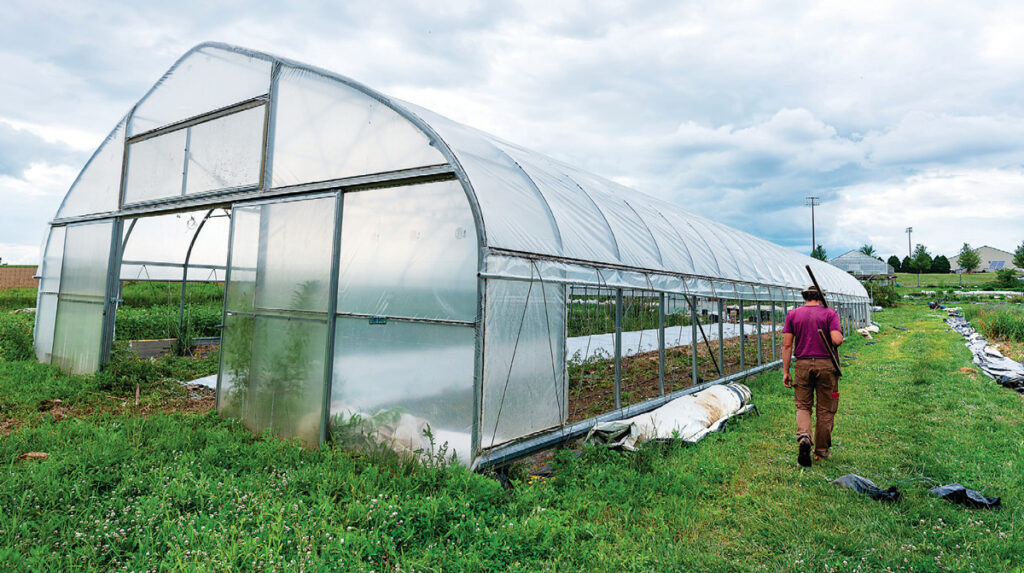
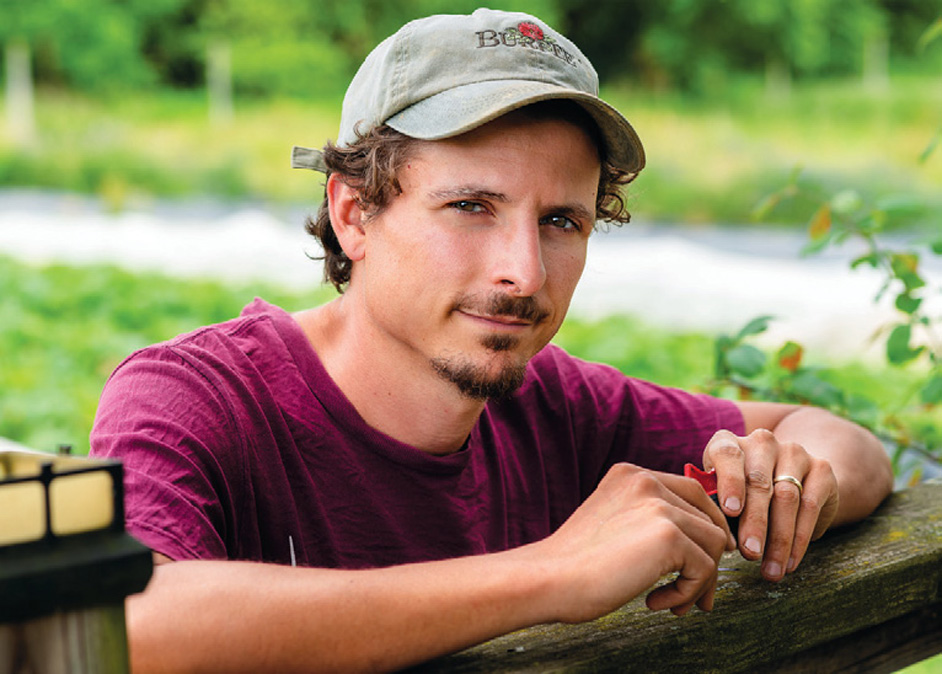
“I really enjoyed the work and I felt like I was utilizing the whole person,” he says. Working as a college farmer allows him to cultivate the next generation of academically grounded, practically equipped students and farmers.
Any Lafayette student can experience the farm, whether as a volunteer, as a member of a class whose coursework directly engages with it, or as an intern with the Office of Sustainability. Parr’s challenge is not only to run the farm (which over the past 16 years has grown to include solar-powered irrigation, a high tunnel, a deer fence, and a new greenhouse) but to collaborate with faculty and staff in ways that benefit the students and the community. Any produce that comes out of LaFarm is distributed through four local routes: the Lafayette dining halls, an on-campus farm stand, Easton’s West Ward Market, and food pantries.
LaFarm is about three miles from campus, a distance that offers a welcome invitation for reflection. Since the farm’s inception, engineering capstone courses have designed more efficient water capture systems and policy courses have investigated legal barriers to accessing farmland, in conjunction with LaFarm. Environmental science classes have investigated the relationships between soil health and the size of kale leaves, for example. And nature-writing classes take inspiration from the farm, whose plots are tended by faculty, staff, and students alike.
LaFarm has hosted various nonacademic events too, including scavenger hunts for summer youth camps, early morning yoga sessions between the rows of vegetables, student presentations about mental health, and year-end celebrations for graduating seniors. “I want students to feel like they can belong in agriculture,” Parr says, “and learning from peers is a really memorable part of that.”
LaFarm partners with Pasa Sustainable Agriculture to allow current students to enroll in their Diversified Vegetable Production Pre-Apprenticeship program, which offers over 250 hours of hands-on training. Parr says, “Even if they aren’t becoming farmers, they’re able to apply all sorts of skills like critical thinking, project management, and collaboration.”
MUHLENBERG COLLEGE
At Muhlenberg College in Allentown, hope is growing above and below ground. Students are the ones making the decisions and designing initiatives at this small liberal arts college. The community gardens live between two college-owned duplexes in which students live rent-free during the summer in exchange for time stewarding the garden. Muhlenberg students are achieving impressive things with their involvement, commitment, and care to community growth through the support of professors Rich Niesenbaum and Kimberly Heiman, who offer up their time. (Students organized to create these gardens in 2010).
Currently, student researchers working with Niesenbaum (professor of biology and co-chair of Muhlenberg’s Sustainability Committee) are developing a soil amendment that enriches underground soil health and supports the growth of mycorrhizal networks. “We’re doing experiential learning, that’s the value of college farming,” Niesenbaum says. “We’re getting our hands into the soil, trying and then failing. I’m here to support what the students want to do.”
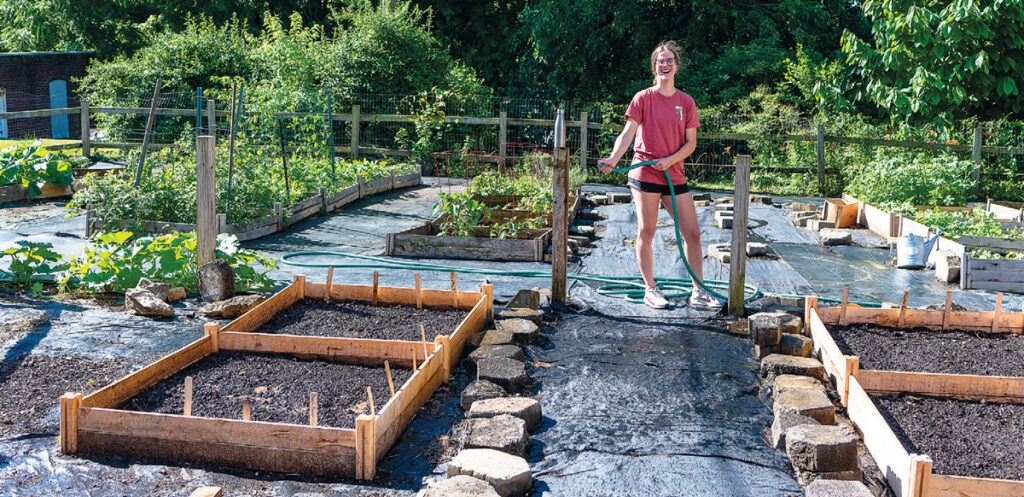
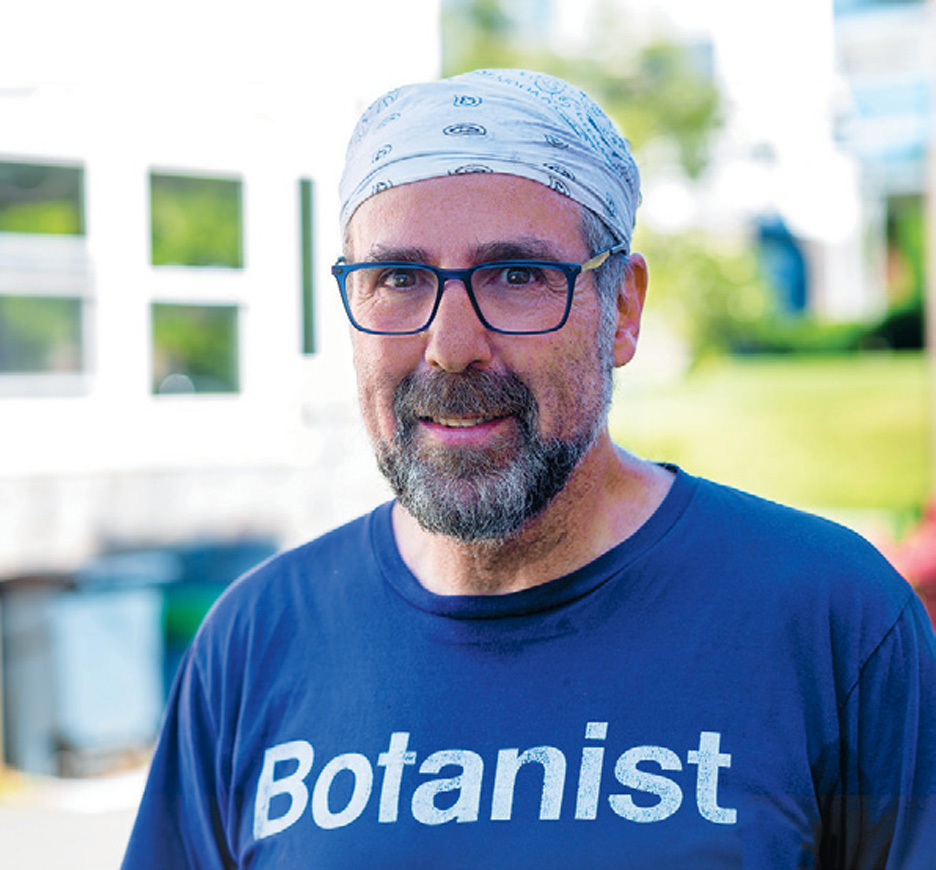
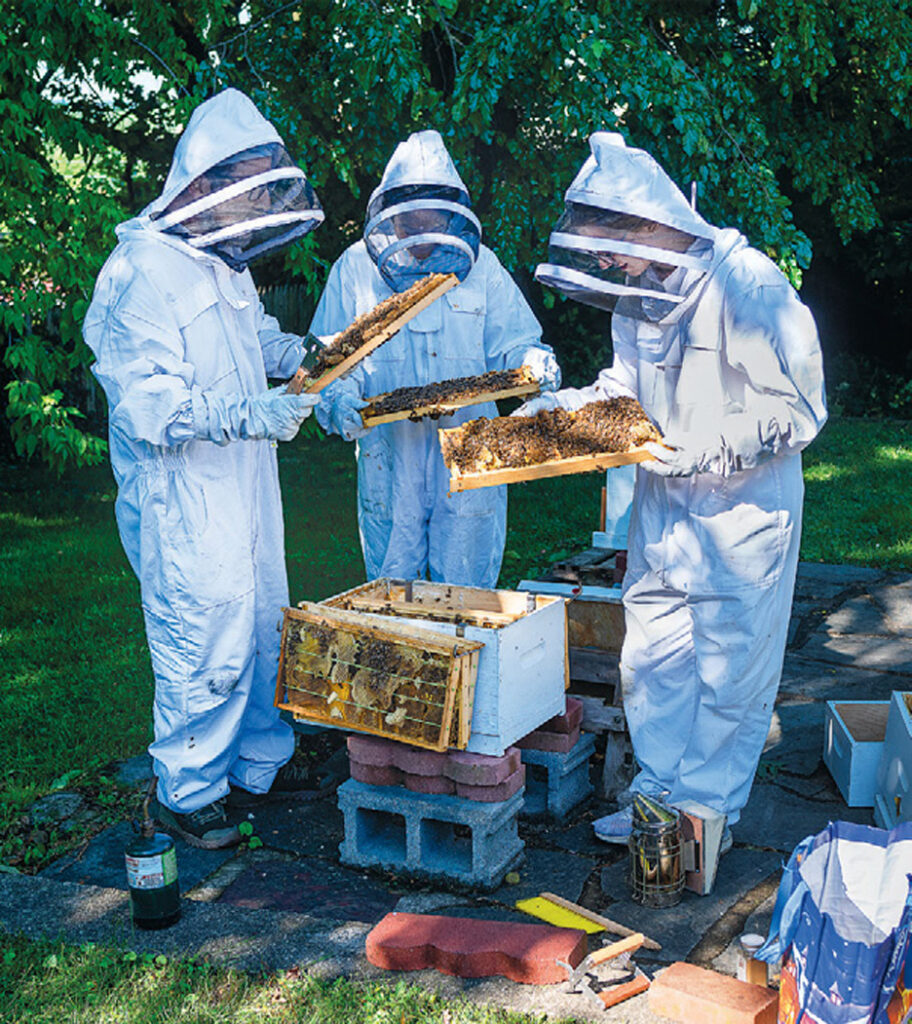
One of the newest initiatives at Muhlenberg involves beekeeping. Niesenbaum recently completed training through the Lehigh Valley Beekeeping Association and is helping manage two on-campus colonies. “It’s been fun, learning side-by-side, developing relationships that go beyond food,” he says.
Kimberly Heiman, senior lecturer in biology and unpaid faculty coordinator of the garden, has helped various classes and student projects modify the space in impactful ways over the garden’s 15 years of operation. These include an engineering course implementing a rainwater capture system, a marketing class designing sustainable branding programs, entomology reports on the pest presence in the garden, and math classes helping to optimize the growing space.
“Students are allowed to make decisions without experience, which might not happen in the real world,” she says, “We’re not focused on providing food in abundance but more on student education and experimentation. We want this to be a safe space for students to make mistakes and become closer to the ground, to plants, to dirt—it’s really a communal effort.”
For Heiman, one of the most rewarding experiences is “watching students register where food comes from and how you get a grown tomato. Getting students digging in the dirt is hugely fulfilling.”
Muhlenberg’s community gardens are holistic in focus: In addition to vegetable production, the space is home to a permaculture garden and a native plant area. Beyond the garden, Muhlenberg tends to a hydroponics garden in the dining hall. Here, students lead the effort of starting seeds, maintaining the system, and coordinating the harvest with the executive chef.
Heiman spoke about the importance of communal stewardship: The garden’s philosophy is that anyone who contributes to the garden can access and utilize any products or produce from the space: “It’s more about community-building around food growth and food issues than it is looking pretty.”
NORTHAMPTON COMMUNITY COLLEGE: EAST 40
In 2010, Northampton Community College (NCC) purchased 40 acres as a buffer against encroaching housing developments. Dubbed NCC East 40 or “the East 40,” the space is a hub of harmony, life, and community. Kelly Allen, English professor and the unofficial coordinator of the East 40, serves as a guide for students navigating their college experience and food production. He also works behind the scenes to visualize different relationships and strengthen programming geared towards the community. “I see flavors of activism in there that need to be identified and embraced,” he says.
For Allen, trying to create programs or spaces without student input, leadership, and creativity would be a futile endeavor. “We need to listen to the students and what they’re bringing to the table. What they’re bringing is who they are.”
The East 40 is home to many ecosystems. These include a forest, meadows where community members take walks and identify native plants, art installations that use earth-based materials, and the farm. All of them play pivotal roles in the NCC community. It is the best-kept secret in the Lehigh Valley.
One of the key strengths of the East40 is the collaborations it enables. For example, Kegan Hilaire, a farmer who completed the Rodale Institute Farmer Training and the Seed Farm’s Incubator Program in Emmaus, is the owner and operator of Blackbird Farms. This production-based farm rents about 3.5 acres of the East 40 from the college. He rents another 4.5 acres at the Seed Farm.
“I want to be an example of a long-term, for-profit farmer on land that doesn’t cost much and benefits the institution I am with,” says Hilaire. Another goal is to, ultimately, grow everything for the NCC culinary arts program. Unlike at other institutions, students who work (for a living wage) with Hilaire don’t need to leave campus to experience small-scale farming. The grounds are open for walking or volunteering, and produce is sold at the college’s weekly farmers market.
Allen and Hilaire introduce students to all of the relationships necessary for our food system. They work with ecology students to discuss the influence of birds that live in the meadows. They ponder with philosophy students about what makes a life. And they forage in the forest with culinary students as part of the school’s professional culinary certification program. The lessons prioritize holistic understanding of food systems and production—it’s not just plants or humans. Imagine a multitude of exchanges among soil nutrients, sunshine, active decomposition, efficient irrigation, careful weeding, and intentional care. The ripples of the East 40 and Blackbird Farms are far-reaching. Connections with regional chefs mean space and resources are being fed (quite literally) back into the local food system.
The activities of LaFarm, Muhlenberg College, and the East 40 would not be possible without the interconnected communities that support them. These spaces help students who become involved determine what their next steps might be. They also help students “see themselves as a part of the larger, connected community,” says Allen.
